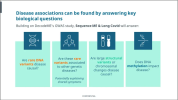OrganicChilli
Senior Member (Voting Rights)
Any chance this will be uploaded to YouTube soon? Not needing a Facebook account would be great
I was able to watch it without an account.
Any chance this will be uploaded to YouTube soon? Not needing a Facebook account would be great
Thanks you very much indeed Andy for all your work and care over these years on DecodeME xUmmm, you are welcome?
Available to rewatch on Facebook here.
Any chance this will be uploaded to YouTube soon? Not needing a Facebook account would be great
I don't have a Facebook account and couldn't watch it using the link @Andy provided but I could watch it by clicking play on the embedded video in this thread. Once it starts playing you can expand it to full screen.In the next week or so.
I think as long as you make it freely available and clearly attribute the source, as I'm sure you would, then I can't imagine there would be a problem.I was able to rip the audio from that facebook link without an account. Is it okay if I upload or share it somewhere @Andy ?
Great, thanks.I think as long as you make it freely available and clearly attribute the source, as I'm sure you would, then I can't imagine there would be a problem.

In other words (and if I have this right), the rare variants might be more revealing of which genes amongst those already flagged by DecodeME, rather than of finding a slew of rare diseases behind ME/CFS.As a clinician I would stick my neck out further and say that if a whole genome study identifies rare monogenic causes in the DecodeME cohort these will indeed be rare explanations for ME/CFS rather than 'other' rare diseases.


I hadn’t noticed but then again only just looked into who he was when you flagged it. Looks like a very handy person to have as part of the team!So that looks like an impressive addition to the team (or was he part of it before?)
Really interesting, so it’s less a case of the rare variants completely changing the picture or being independent of the common variants found, but more that they fill in more missing parts of an already partially formed picture, extra pieces to a half completed jigsaw?In other words (and if I have this right), the rare variants might be more revealing of which genes amongst those already flagged by DecodeME, rather than of finding a slew of rare diseases behind ME/CFS.
How likely is it that looking at rare variants would significantly change the picture from what we see here? (Particularly wrt things like heritability and genetic contribution to the disease). Are there other examples of diseases with multiple rare variants contributing more significantly than common variants?
Really interesting, so it’s less a case of the rare variants completely changing the picture or being independent of the common variants found, but more that they fill in more missing parts of an already partially formed picture, extra pieces to a half completed jigsaw?
Rare variants plus methylation info will be really informative .Might there be a bit of both?
Rare variants are rare, but it's not rare for individuals to have some. There might be patterns or pointers there, e.g. a scatter of variants showing up in the same region that on their own wouldn't attract any attention.
FYI, here's the YouTube link, it's on the DecodeME channel:Any chance this will be uploaded to YouTube soon? Not needing a Facebook account would be great
